Emerson Honors ‘BoJack Horseman’ Creator Bob-Waksberg for Making Comedy with Social Impact

By Erin Clossey
Emerson’s Center for Comedic Arts presented BoJack Horseman creator Raphael Bob-Waksberg with its first Ready Wit Award in Comedy Friday, October 30, in recognition of his “significant contributions to comedy while advancing social change.”
“You are a powerful role model to up-and-coming comedians, and of course, to all of us,” President Lee Pelton told Bob-Waksberg in a congratulatory video shown before the ceremony, which was held live over Zoom and hosted by Raven Goldston ’22, a student in the BFA in Comedic Arts program.
The Ready Wit Award is named for Aristotle’s term for the type of comedian who strives for truth and whose jokes are backed by learning and a keen understanding of human nature. It’s one of several awards and events sponsored by the Center for Comedic Arts, which explores the role and relevance of comedy in society through research, academic study, and professional development.
BoJack Horseman, an animated series about an anthropomorphic horse and washed-up TV star from the 1990s, has been praised by critics and fans for its depiction of series social issues. BoJack (Will Arnett) is a complex and not-always-likeable character who struggles with alcoholism, depression, anxiety, and cripplingly low self-esteem.
In another video shown prior to the ceremony, Comedic Arts students and faculty talk about why the show is so funny and yet so meaningful.
“I’ve had students who share with me or share with the class that they’re going through things that are depicted on the show,” Associate Professor Manny Basanese said. “I think for a lot of them, it ends up being a …revelation that they can bring these powerful elements into their [comedy] work.”
Bob-Waksberg joked that he when he first heard he was getting the “Reddi-wip Award” he was excited, because that’s his favorite brand of nitrous oxide-propelled sweetened whipped cream. But then when he learned what he was actually winning, he became worried.
“Does my comedy address the most pressing issues of the day, and should comedy address the most pressing issues of the day?” he wondered. There is no lack of comedians tackling society’s ills, and yet they persist.
Bob-Waksberg asked himself three questions in his acceptance speech, and set out to answer them: Can comedy make a difference? Should comedy make a difference? How can comedy make a difference?
Regarding the first question, Bob-Waksberg decided that while comedy alone probably cannot take down the oppressors, it can lift up those being oppressed.
To the second, he related a story about the director Elia Kazan receiving a Lifetime Achievement Award at the 1998 Oscars. Half of the audience decided not to stand when he was presented his award, in protest of his 1952 testimony in front of the House Committee on Un-American Activities, which resulted in several actors suspected of communism being blacklisted. The other half of the room stood. Everyone was saying something with their decision.
“You cannot recuse yourself from discourse,” Bob-Waksberg said. “Silence is a statement. Abstention from voting is a vote for something. All of these decisions have weight, both subtle and profound. … What you’re doing matters in life and in comedy.”
To answer the last question – how comedy can make a difference – Bob-Waksberg called on the future comics to “aim for laughs of recognition, not laughs of superiority.”
Comedy is a “normalizing” force. If used well, it can normalize for good, making people feel seen and understood despite their foibles. It can also normalize for bad, passing cruelty off as wit.
“Sometimes we tell ourselves, ‘If what I say is funny enough, it doesn’t matter who it hurts.’ But that’s only true if the only thing you care about is being funny, and if the only thing you care about is being funny, then I’m sorry, you are a boring person,” he said.
Comedians have power and they should use it wisely, he added.
“I’m sure you thought my speech would be funnier,” Bob-Waksberg said before answering questions submitted by students and playing a BoJack trivia game. “But I already have your award and I’m not giving it back.”
Categories